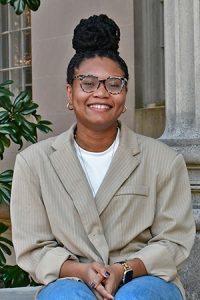Emerging Library Leader
 Imagine a vibrant hub where a library seamlessly merges with a community and social services center. Picture a father attending a story time with his child while consulting with a social worker about elder care for his parents. Envision an unhoused teenager accessing showers, free laundry facilities, and computers for schoolwork, all under one roof. These transformative spaces are beginning to emerge across the nation, and they embody the vision that Lyric Grimes is passionate about bringing to life. As a member of the American Library Association’s 2024 Class of Emerging Leaders, she’s just the future librarian who might help build these important community resources.
Imagine a vibrant hub where a library seamlessly merges with a community and social services center. Picture a father attending a story time with his child while consulting with a social worker about elder care for his parents. Envision an unhoused teenager accessing showers, free laundry facilities, and computers for schoolwork, all under one roof. These transformative spaces are beginning to emerge across the nation, and they embody the vision that Lyric Grimes is passionate about bringing to life. As a member of the American Library Association’s 2024 Class of Emerging Leaders, she’s just the future librarian who might help build these important community resources.
Growing Up
A young Lyric was likely found in one of two places in her hometown of Lexington, Kentucky: the library or Barnes & Noble. She would sit and read, checking in with her mom by text or phone every hour and when she was ready to head home. Her love for learning blossomed, and by seventh grade, she was delving into Chinese language classes. Recognizing her aptitude, a teacher encouraged her to pursue Chinese studies in college, igniting a passion that would shape her academic journey.
A College Odyssey
“Growing up in Kentucky, I didn’t see a lot of nerdy, black kids like me. When I went to Oberlin College for a visit I saw a diverse range of black people, interests, and kind of a nerdy hipster crowd, and I felt like – this is where I belong.”
Oberlin also offered great programs for what Lyric wanted to study. She graduated with a major in East Asian studies and minors in women and gender studies and comparative American studies. After graduating she received Oberlin’s Shansi fellowship. She taught English as a second language at Beijing Normal University until the pandemic hit, and then returned to Kentucky.
Path to UNC
Back in Kentucky, Lyric found herself at a crossroads, pondering her next steps while working at a local coffee shop. She was exposed to people without access to higher education and spent time considering inequality. She considered how she would be able to help and returned to her lifelong love of libraries.
She realized, “I love libraries, libraries have done a lot for me. I wanted to go study more about books, working with children, how we can lift up the new generation coming after us.”
A quick Google search for “library programs near me” led Lyric to the SILS website, where she read various faculty biographies and learned about the school’s reputation. She applied for and was accepted into the Master’s in Library Science program.
Library Studies
Lyric arrived at UNC in Spring 2020, during the height of the pandemic and remote learning, which she describes as a tough time of being stuck in her apartment alone.
“One saving grace was that I got a job at Wilson Library as a graduate assistant. That helped me make connections on campus and meet people, get out of my apartment.”
She began learning about basic library principles, what it means to work in an archive in a library, and how to provide service to stakeholders and patrons. During the last semester of her master’s program, a guest speaker in a class talked about trauma-informed principles in public library spaces
“As she was talking, I thought, ‘That’s it! That’s what I want to study. That’s what I want to pursue because public librarians are service workers. With COVID, homelessness, and inequality everywhere, the library is on the rise for where people are going for those resources. I wanted to study what impact we, as librarians, have on the community and vice versa, and how we can use the library as a community center and service center.”
Someone she consulted with convinced Lyric that she should consider another school for her doctoral program, so while UNC was one of four programs that accepted her, she initially turned down the acceptance.
“I hit the ‘no’ on UNC and I just broke down crying. I called my mom and said, ‘I think I just made the worst decision ever.’”
Fortunately, she was able to rescind her decision and enroll in the PhD in Information and Library Science program at UNC—and to continue her path at the place that now felt like home and with the community that supported her.
During her time in SILS she has racked up an impressive list of awards and recognitions, including the Gates Millennium Scholarship, North Carolina Excellence Fellowship, BCALA Breaking Barriers Fellowship, and Harvey Beech Scholarship.
Library Future
Today, Lyric is reading and gaining knowledge in preparation for her doctoral research. She’s taking classes in social work and working on building her own course in preparation for her teaching practicum next year. She hopes to work on creating a trauma-informed framework for practicing librarians so that libraries can be safe and joyful spaces for all.
She pictures a future where she can work with children, possibly in a library community engagement or outreach position. Wherever she goes, you can be sure you’ll find excellence and a leader dedicated to building safe spaces for the next generation of library kids.
Related Programs: Doctor of Philosophy in Information and Library Sciences
